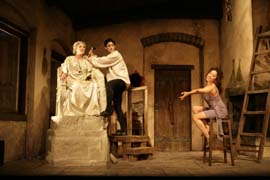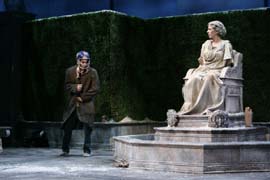
Dorothy Chansky
Truisms Chiseled in Stone
''Persephone''
Presented by the Huntington Theatre Company
March 30-May 6, 2007
At Stanford Calderwood Pavilion, Boston Center for the Arts, 527 Tremont
Street
Tues.-Sun. evenings; matinees on Wed., Sat., Sun. (some exceptions)
Tickets: $14-52; group and senior discounts
Box Office: (617)273-1665 or www.huntingtontheatre.org or www.BostonTheatreScene.com
 |
| Italian Renaissance sculptor Giuseppe (Seth Fisher, center) takes inspiration from his model Celia (Mimi Lieber, r.) as he creates a statue of Demeter, Greek goddess of the harvest (Melinda Lopez, l.) Photo by Charles Erickson. |
Imagine spending half your time basking in sunshine and familial love and the other half stuck with the literal boss from hell. That's the mythical Persephone's set-up, and maybe it looks normal enough from the present-day perspective of a fast-track young woman dressing for success and working the second shift.
It's not normal from the perspective of said young woman's adoring mother, though. Especially if the reason for the daughter's underworld ties (remember, this is not a metaphor) is an abduction to which her father agreed. What mother wouldn't grieve (and fume)?
The mythical mother, Demeter, is the real subject of Noah Haidle's imaginative, zany, and ultimately very sad new play. Here, Demeter is a statue with the gifts of both gab and compassion but cursed by the frustrating fact that no one can hear her wisdom or warnings. Well, not quite no one. She confides in the audience nearly non-stop and is perfectly audible to two sociologically inclined and prolix rodents only too eager to give her a run for her philosophical money.
 |
| An insane man obsessed about football (Seth Fisher) is one of the many characters who inhabit a corner of the New York City park where a statue of Demeter (Melinda Lopez) sits. Photo by Charles Erickson. |
Haidle's play opens in 1507 in Florence, where up-and-coming sculptor Giuseppe is trying to get just the right sense of yearning in the left shoulder of his commissioned monument. Seth Fisher is the youthful artist, an idealist obsessed with his work until his sexy and self-absorbed model Celia (Mimi Lieber) whisks him off to an orgy at the home of his crass, fast-talking patron (Jeremiah Kissel). The statue, of course, is Demeter (played by the vibrant Melinda Lopez), who craves Giuseppe's touch, is jealous of Celia, and believes in both her sculptor's talent and the ennobling value of high art. Jenny Mannis's costumes and David Korins's sets combine to create a draped marble statue who anchors a stone and wooden-beamed studio in the first act and a present-day New York City park in the second. (The audience is as excited as Demeter herself when her arm suddenly emerges from the block of marble in which it's been buried.)
Unsurprisingly, Florence in the spring is life and affirmation (abetted by Ben Stanton's golden, glowing lighting). New York in the winter is Hades. In 2007, Demeter unwillingly presides over a park, where she watches a daily parade of murders, death by freezing, rapes, drug deals, and undercover cops willing to turn a blind eye in exchange for a blow job. She longs to be able to turn away or close her eyes, but she can't, because she's a statue.
 |
| Giuseppe (Seth Fisher) falls for Celia's charms (Mimi Lieber). Photo by Charles Erickson. |
Humans, naturally, can close their eyes, and part of Haidle's point is that to do so is to turn our hearts to stone. The playwright also has some things to say about art, and the rodents help there. Act one's Italian mouse (the energetic and versatile Mr. Kissel) has no time for Demeter's rhapsodies about things of beauty and joys forever. His life is about finding food, escaping felines, and watching friends die. He is, in short, a peasant with class consciousness. His act two descendant (Mr. Kissel again) is a rat with a passion for art and music whose favorite pastime is visiting the Metropolitan Museum on Mondays, when it's closed and no one will scream or call the exterminator. It's tough being a proletarian with patrician tastes in a world where people have knee-jerk prejudices about small foraging species (read class or maybe race).
Director Nicholas Martin culls heartfelt performances from his ensemble of four, who collectively play about twenty roles. Mimi Lieber is notable in her ability to go from a drugged whore to street signer with guitar to mother mourning her murdered daughter (the play's real life Demeter) in a matter of seconds.
Haidle learned his craft by immersing himself in classical
plays, reading one a day and transcribing them to get a real understanding
of how they work. He borrows one of the oldest techniques in the book, the
deus ex machina, to end Demeter's suffering. Real life sympathizers-presumably
the audience who enjoy art and deplore poverty and crime-will have
to work harder to salvage social spring from urban Hades.
Dorothy Chansky

| museums | NYTW mail | recordings | coupons | publications | classified |